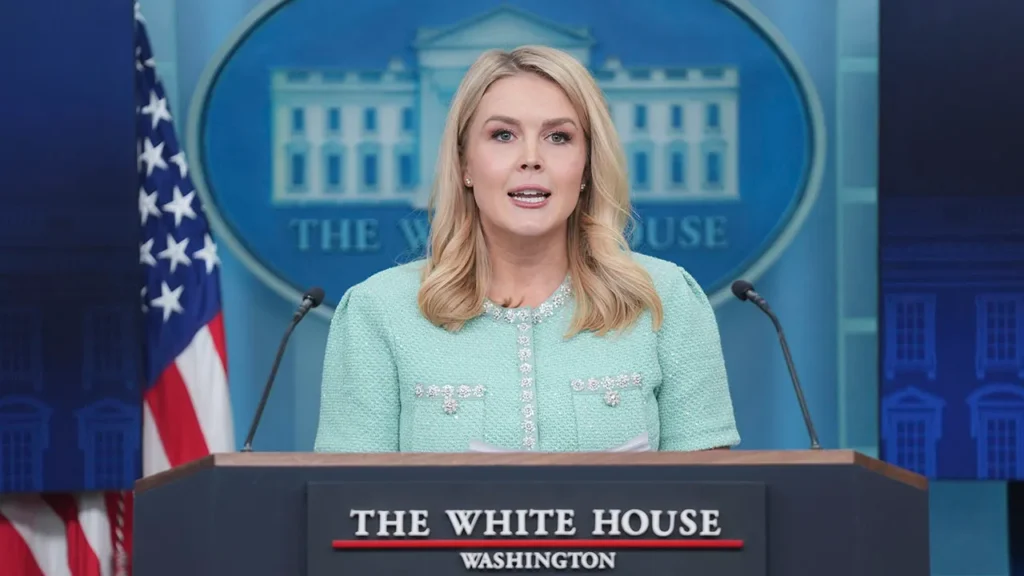NEWS
White House Rubio May Revoke Visa or Green Card of Activist Mahmoud Khalil
White House press secretary Karoline Leavitt announced on Tuesday that Secretary of State Marco Rubio retains the authority to revoke the green card or visa of former Columbia University graduate student Mahmoud Khalil. The decision comes amid heightened tensions following Khalil’s arrest by Immigration and Customs Enforcement (ICE) and his potential deportation.
Leavitt stated that the Immigration and Nationality Act grants the secretary of state the right to revoke visas or green cards if an individual’s presence is deemed adversarial to the foreign policy or national security interests of the United States. She accused Khalil of abusing the privilege of studying in the country by supporting Hamas, a group designated as a terrorist organization by the U.S. government.
Leavitt went on to detail Khalil’s alleged activities, which included organizing protests that disrupted campus operations, distributing pro-Hamas flyers, and creating an unsafe environment for Jewish students at Columbia. She claimed that the Department of Homeland Security had obtained copies of these materials, which were reportedly distributed with Khalil’s assistance.
“This administration will not tolerate individuals benefiting from the opportunity to study in this country while siding with terrorist organizations that have killed innocent men, women, and children,” Leavitt declared. “We have a zero-tolerance policy for siding with terrorists. Period.”
According to a senior State Department official, Rubio determined that Khalil’s continued presence in the U.S. could have severe adverse consequences for the nation’s foreign policy. As a result, he may be subject to deportation under Section 237 (a)(4)(C) of the Immigration and Nationality Act, a rarely invoked provision allowing the secretary of state to remove individuals whose presence is deemed harmful to U.S. foreign interests.
Khalil, originally from Syria and born to Palestinian parents, entered the U.S. in 2022 to pursue graduate studies at Columbia University. He was arrested by ICE agents at his university-owned apartment in New York and transferred to a detention center in Louisiana, which has the highest population of detained migrants in the country. His case has sparked outrage among activists and students, with protests erupting across New York City demanding his release.
Legal experts argue that Khalil’s case presents significant constitutional concerns. A federal judge in New York City temporarily blocked his deportation on Monday, pending a hearing scheduled for Wednesday. Khalil’s lawyers claim that ICE violated his constitutional rights and are seeking his immediate return to New York.
The arrest has also become a political flashpoint, with former President Donald Trump praising ICE’s actions. Trump called Khalil’s arrest “the first of many to come” and warned that other students engaging in similar activities would also face consequences. “We know there are more students at Columbia and other universities across the country who have engaged in pro-terrorist, anti-Semitic, anti-American activity,” Trump wrote on Truth Social. “We will find, apprehend, and deport these terrorist sympathizers from our country—never to return again.”
Meanwhile, Khalil’s supporters argue that his detention is politically motivated and a violation of free speech. Hundreds of protesters gathered in New York City on Monday night, demanding his release and organizing a nationwide student walkout. While the walkout did not materialize as expected on Tuesday, a small group of demonstrators gathered on the steps of Columbia University, chanting in favor of Khalil’s freedom.
Democrats on the Senate Judiciary Committee, led by Senator Dick Durbin, condemned Khalil’s detention, calling it an example of “straight-up authoritarianism.” Some lawmakers have expressed concern that the Trump administration is using immigration enforcement as a tool to suppress dissent on college campuses.
The case has also drawn attention to broader issues of federal funding for universities. The Trump administration recently revoked $400 million in grants for Columbia University, citing concerns over anti-Semitic discrimination on campus. The U.S. Department of Education has sent letters to 60 colleges and universities warning them that they could lose funding if they fail to address such allegations. Representative Jerry Nadler criticized the move, stating that cutting funding for Columbia’s cancer research does not combat anti-Semitism but rather advances Trump’s goal of controlling higher education.
New York City Mayor Eric Adams was asked about Khalil’s case on Tuesday but deflected the question by drawing a parallel to his own legal troubles. “What I’m finding surprising is the level of support you’re all displaying. But I didn’t see that support for me,” Adams told reporters, referencing the corruption case against him that the Trump Justice Department ultimately dropped. “Don’t be inconsistent in your call for justice,” Adams said, implying that political motivations may be at play in both cases.
As the legal battle over Khalil’s fate unfolds, tensions continue to rise on college campuses, where students and faculty are grappling with the implications of his arrest. The upcoming court hearing on Wednesday will determine whether Khalil will remain in the U.S. while his case is adjudicated or if he will be deported to Syria.
The case has further fueled debates on immigration policy, free speech, and the role of the U.S. government in regulating campus activism. As political leaders weigh in on the controversy, the outcome of Khalil’s case may set a precedent for future actions against foreign students involved in political activism on American soil.